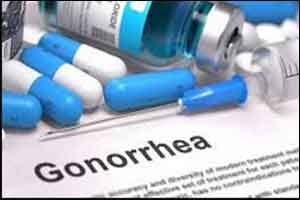- Home
- Editorial
- News
- Practice Guidelines
- Anesthesiology Guidelines
- Cancer Guidelines
- Cardiac Sciences Guidelines
- Critical Care Guidelines
- Dentistry Guidelines
- Dermatology Guidelines
- Diabetes and Endo Guidelines
- Diagnostics Guidelines
- ENT Guidelines
- Featured Practice Guidelines
- Gastroenterology Guidelines
- Geriatrics Guidelines
- Medicine Guidelines
- Nephrology Guidelines
- Neurosciences Guidelines
- Obs and Gynae Guidelines
- Ophthalmology Guidelines
- Orthopaedics Guidelines
- Paediatrics Guidelines
- Psychiatry Guidelines
- Pulmonology Guidelines
- Radiology Guidelines
- Surgery Guidelines
- Urology Guidelines
Zoliflodacin-New antibiotic for uncomplicated gonorrhea

A new study published in NEJM reports that Zoliflodacin is safe and efficacious in curing most cases of uncomplicated gonorrhea. The results of Phase 2 multicentered clinical trial reveals that Zoliflodacin cured all rectal gonorrheal infections (4 of 4 participants who received the 2-gram dose and 6 of 6 participants who received the 3-gram dose) as did ceftriaxone (3 of 3 participants).
Zoliflodacin (formerly known as ETX0914 and AZD0914), developed by Entasis Therapeutics represents a new type of oral antibiotic that inhibits DNA synthesis in a different way than currently approved antibiotics.
Read Also: A step further towards developing Gonorrhea vaccine
"The rate of reported gonorrhea cases in the United States has increased 75 percent since the historic low in 2009, and antibiotic resistance has considerably reduced the number of treatment options for this disease," said NIAID Director Anthony S. Fauci, M.D. "These encouraging research findings published today suggest that zoliflodacin has the potential to be a useful and easy-to-administer oral antibiotic for treating gonorrhea."
Stephanie N. Taylor and associates conducted the study from November 2014 through December 2015 and recruited patients from sexual health clinics. The trial enrolled 179 participants (167 men and12 non-pregnant women) ages 18 to 55 years with either symptom of uncomplicated urogenital gonorrhea, untreated urogenital gonorrhea or sexual contact with someone with gonorrhea within 14 days before enrollment.
Participants were randomly selected to receive either a single 2 or 3-gram dose of oral zoliflodacin or a 500-milligram (mg) dose of injectable ceftriaxone. Among the 117 per-protocol participants who were evaluated six days after treatment, 98 percent (48 of 49 participants) of those who received the 2-gram zoliflodacin dose, 100 percent (47 of 47 participants) of those who received the 3-gram dose, and all (21 of 21) of the participants in the ceftriaxone group were considered cured of their urogenital gonorrhea based on culture results.
The study found that Zoliflodacin cured all rectal gonorrheal infections (4 of 4 participants who received the 2-gram dose and 6 of 6 participants who received the 3-gram dose) as did ceftriaxone (3 of 3 participants). However, the investigational drug was not so effective in treating patients with gonorrhea infections of the throat (pharyngeal): 67 percent of volunteers who received the 2- gram dose (4 of 6 participants) and 78 percent of those who received the 3-gram dose (7 of 9 participants) were cured. All of the participants (4 of 4) in the ceftriaxone group achieved a cure.
The investigational antibiotic was well tolerated with transient gastrointestinal upset, the most commonly reported adverse effect. Microbiological evaluation of post-treatment clinical isolates did not demonstrate resistance to zoliflodacin.
Zoliflodacin has been awarded fast-track status by the U.S. Food and Drug Administration for development as an oral treatment for gonococcal infections. It is expected to begin Phase 3 testing in the Netherlands, South Africa, Thailand, and the United States next year.
Read Also: New antibiotic class found effective against gonorrhea in the laboratory
Gonorrhea is a common sexually transmitted disease (STD) that affects both men and women, particularly young people ages 15 to 24 years. If untreated, gonorrhea infection can lead to pelvic inflammatory disease, ectopic pregnancy, infertility, and an increased risk of HIV infection. Pregnant women can pass the infection to their babies, who can become blind or develop life-threatening infections as a result.
Gonorrhea is caused by the bacterium Nesseria gonorrhoeae, which has progressively developed resistance to each of the antimicrobials used to treat it. As a result, in 2015, the U.S. Centers for Disease Control and Prevention revised gonorrhea treatment guidelines to recommend dual therapy with injectable ceftriaxone and oral azithromycin to reduce the emergence of resistance to ceftriaxone.

Disclaimer: This site is primarily intended for healthcare professionals. Any content/information on this website does not replace the advice of medical and/or health professionals and should not be construed as medical/diagnostic advice/endorsement or prescription. Use of this site is subject to our terms of use, privacy policy, advertisement policy. © 2020 Minerva Medical Treatment Pvt Ltd